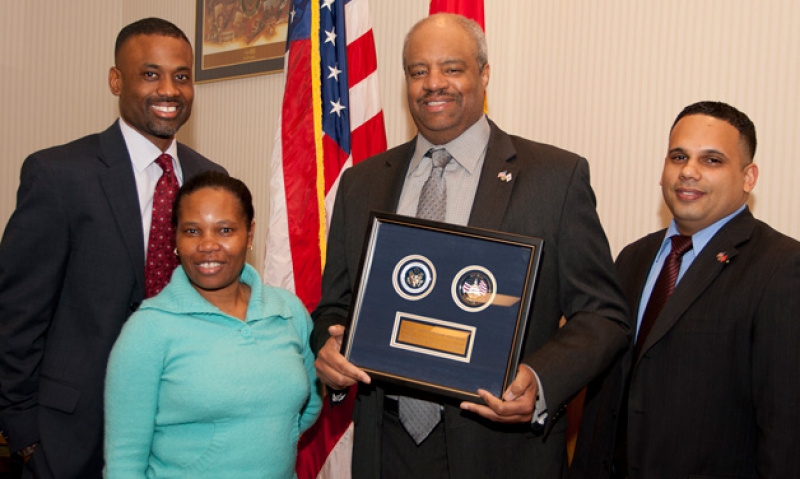
Commander Hill says that advance VA appropriations are “an extremely important step forward in the budgetary process, and will go far in giving veterans the health care they deserve.”
The American Legion testified on Capitol Hill today, telling the House Veterans Affairs Committee that the $125 billion VA budget for fiscal 2011 is a much-appreciated result of advance appropriations for veterans health care – a cause the Legion has championed on for many years.
Legion’s National Commander Clarence Hill said that advance VA appropriations are “an extremely important step forward in the budgetary process, and will go far in giving veterans the health care they deserve.”
“We’re certainly pleased with this budget because it meets or exceeds most of The American Legion’s funding recommendations,” Hill said.
“Clearly, the budget request appears to direct funding to assure veterans and their families would receive timely access to the highest quality benefits and services provided by VA,” said Steve Robertson, the Legion’s legislative director, in his prepared remarks. “The American Legion sees these benefits and services as earned through honorable military service.”
Besides addressing several high-priority goals in his remarks, such as reducing the VA claims backlog and eliminating homelessness among veterans, Robertson said the budget also covers other areas of Legion concern. These ares include expanding health care eligibility among veterans, meeting the needs of women veterans and improving health care access for veterans in rural areas.
Robertson is one of three American Legion experts who have testified before Congress in the last two days. On Feb. 3, Ian de Planque and Denise Williams shared The American Legion’s perspective with two House subcommittees. De Planque is the Legion’s assistant director for claims service and Williams is the assistant director for research and policy.
At the House Subcommittee on Disability Assistance and Memorial Affairs, testimony from The American Legion centered on the Veterans Benefits Improvement Act of 2008. Noting that the final wish of many veterans is to have their families continue receiving benefits after their death, de Planque said that VA “has yet to publish a proposed regulation” to make that wish a reality.
“The process of publishing a proposed regulation, receiving public comment and assimilating it into a final regulation is already a lengthy process, yet it has not even begun,” de Planque said. “Sixteen months without VA publishing a proposed regulation is unacceptable.”
Also unacceptable, as far as The American Legion is concerned, is VA’s work-credit system used in the disability claims process. The Veterans Benefits Improvement Act of 2008 called for a study of the work-credit system in order to improve accountability, quality of work and accuracy in processing compensation and pension claims.
“The American Legion has long argued that the current work-credit system in use by the VA contributes substantially to the ongoing backlog of VA claims,” de Planque said in his testimony. “To date, we have received no updates on the results of any study, or even whether or not such a study is in process.”
De Planque said VA promised a report on its work-credit system would be submitted no later than Oct. 31, 2009.
Williams spoke to the House Subcommittee on Health about Project HERO (Healthcare Effectiveness through Resource Optimization). This program, initiated in 2007, manages health care services purchased by VA through the Humana and Delta Dental insurance companies.
Discussing the quality of caregivers used by Project HERO, Williams urged VA to “increase its efforts to enforce criteria for the certification of caregivers, do follow-up investigations and conduct training” to make sure the quality of care meets the standards of those maintained at VA facilities.
Williams also recommended that the VA review the treatment procedures for Project HERO patients. “If it is found that excessively expensive or unnecessary treatments have been performed, the service provider should be charged back or decertified for repeat infractions.”
Williams too urged the VA to prevent the abuse of Project HERO’s provisions. For example, “if the emphasis on cost savings becomes too great, we could see a scenario where an administrator would delay repair or purchase of equipment,” choosing instead to use Project HERO services as a less expensive alternative, she said.
- Legislative

